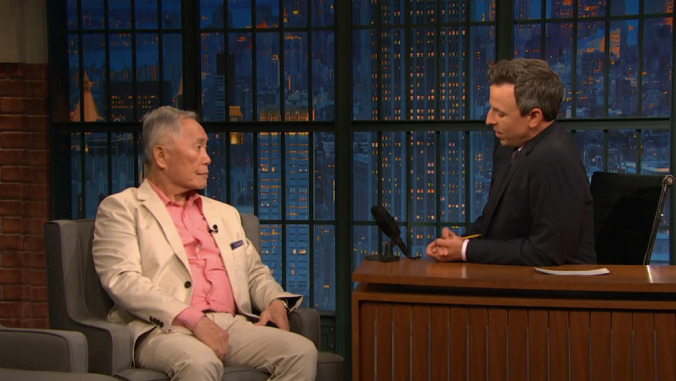On Late Night, George Takei calls Trump's camps "a grotesque new low" for America

George Takei’s position as Lieutenant (then Captain) Hikaru Sulu has long made him the revered goofy grandpa of nerd-dom, with the now 82-year-old actor parlaying his Star Trek fame into a career as his inimitably droll, sonorous, and happily self-parodying self. And, as he showed Seth Meyers while whipping out a double-handed Vulcan salute on Monday’s Late Night, he’s all too happy to give the fans what they want. “We have lived much longer than we expected,” said Takei.
That’s a sentiment that echoed through most of Takei’s appearance on Monday, really. There technically to plug his role (as actor and consultant) in the second season of AMC’s The Terror (called The Terror: Infamy), Takei (whose Broadway musical Allegiance also chronicled his harrowing early life) told Meyers how his now well-known personal experience with the WWII American policy of rounding up Japanese-American citizens in camps like the one recreated for the AMC series has always informed his view of America’s past—and now, unthinkably, its present. Noting how the 6.5 acre set for The Terror: Infamy brought back complicated memories, Takei praised the series for replicating everything he remembers of that time, including the under-barracks crawlspace he and his brother used to hide under with their adopted puppy. “To me, it was kind of a nostalgic return,” intoned Takei, explaining that, for a five-year old boy, the experience of the camps was often one of innocently unaware adventure.
Of course, as Takei noted, that was because he had his parents there “to protect us from the reality that was surrounding us.” That reality, Takei pointed out, was that “They were American concentration camps for Americans of Japanese ancestry.” Saying that the term “Japanese intenrment camps” is a linguistic bit of whitewashing that’s always served to drive him “up the wall,” Takei explained, “we were in Japanese-American internment camps.” Takei—a longtime vocal opponent of Trump, and other bigots more generally— then responded to Meyers’ prompting about parallels to the current Trump administration policy of “children, being torn away from their parents” by saying that it represents a “grotesque new low” for the country.
Unsparing in his thoroughly informed assessment of Donald Trump and the Republican Party’s choice to bring back (but with the added horror of filthy conditions and family separation) a once thought unrepeatable American crime against (non-white) humanity, Takei called out the administration’s woefully “incompetent” efforts to follow court orders to reunite immigrant families, and called the scattershot dispersement of children in places as far away from their border-held parents as New Jersey, Minnesota, and Wisconsin, “intentional cruelty.” “Evil,” Takei followed up that assessment, with the gravitas of someone who recognizes the familiar face of such evil from a long time ago.